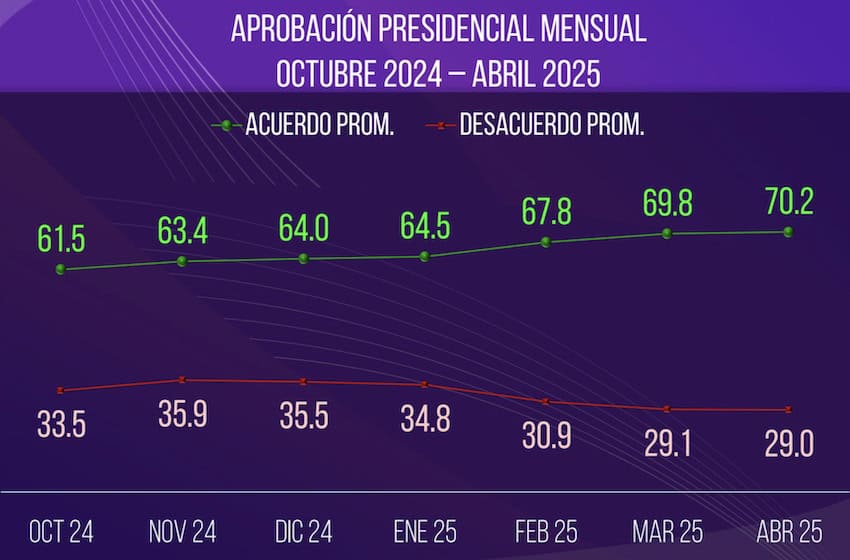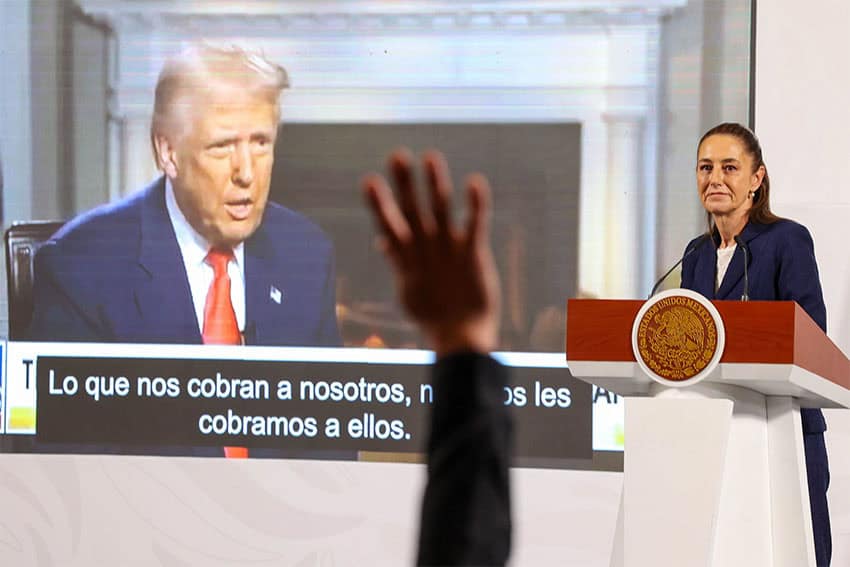Just over seven months into her six-year presidency, President Claudia Sheinbaum remains a very popular leader, according to the results of two polls conducted in April.
The latest El Financiero poll detected an 81% approval rating for Mexico’s first female president, while a much larger survey conducted by the Mitofsky polling company for the newspaper El Economista found a 70.2% approval rating for Sheinbaum.

According to the El Financiero poll results, Sheinbaum’s approval rating declined two percentage points compared to March.
Among respondents to the Mitofsky/El Economista poll, the president’s approval rating has never been higher, increasing 0.4 percentage points in April to go above 70% for the first time since she was sworn in on Oct. 1.
Strong support for Sheinbaum’s plan to ban US government advertising in Mexico
For its poll, El Financiero surveyed 1,100 Mexican adults by telephone, with interviews conducted between April 3-7 and between April 24-28.
Per the newspaper’s poll results, Sheinbaum’s approval rating has been above 80% every month so far this year. It peaked at 85% in February before falling two points in March to 83% and two points again in April to 81%.
El Financiero also asked poll respondents to assess the Sheinbaum administration’s relationship with United States President Donald Trump, who has imposed tariffs on a range of imports from Mexico and last month accused the Mexican government of being “very afraid” of drug cartels. The percentage of those who expressed the view that the Mexican government is conducting its relationship with Trump “well” or “very well” increased 14 points from March to 50% in April, the highest level since the U.S. president began his second term.
Thirty-seven per cent of respondents expressed the opposite view, down from 46% in March. It was the first time that the percentage of respondents with a negative view of the way in which the Sheinbaum administration is conducting its relationship with Trump was lower than the percentage of those with a positive view.

Mexico avoided the United States’ so-called “reciprocal tariffs” in early April, which was perhaps a factor in the increase in the percentage of poll respondents who believe that the Sheinbaum administration is doing a good job managing its relationship with the United States.
Forty-five per cent of El Financiero poll respondents said they had seen the United States’ government’s anti-immigration ads that aired in Mexico in April, while 55% said they hadn’t. Almost two-thirds of those polled — 64% — said that Mexico should ban U.S. government “announcements or commercials” in the Mexican media. Only 28% of respondents said they should be allowed.
Sheinbaum submitted a telecommunications reform bill to Congress in late April that sought to prohibit paid foreign propaganda. The legislative process related to the bill is currently on pause pending broad dialogue with stakeholders.
Among the other findings of El Financiero’s April poll were that a strong majority of people believe that the Sheinbaum administration is doing a good job managing the economy (74%) — which expanded in the first quarter of the year — and providing “social support,” or welfare payments, to citizens (83%).
A minority of respondents believe that the government is doing a good job combating corruption (39%) and organized crime (35%), although homicides have declined since Sheinbaum took office.
Support for Sheinbaum strongest in Oaxaca, weakest in Sinaloa
More than 47,000 Mexicans responded to the Mitofsky/El Economista poll, which was conducted over the internet in April.
The Mitofsky/El Economista poll results from the past seven months show that Sheinbaum’s approval rating has increased every month between October and April, rising by a total of 8.7 percentage points in the period. The percentage of respondents who disapprove of the president’s performance has declined 4.5 points in the same period to 29%.
The poll detected the highest level of support for Sheinbaum in Oaxaca, where 82.6% of respondents said they approved of the president’s performance. The southern state is one of Mexico’s poorest, but economic growth has recently accelerated, in part due to government investment in Oaxaca, which has benefited from the Isthmus of Tehuantepec trade corridor project.
The only other state where Sheinbaum’s approval rating exceeded 80% was Quintana Roo, home to tourism destinations such as Cancún and Tulum.
The president’s approval rating was lowest in Sinaloa, which has been plagued by high levels of cartel violence since 2024 due to a fierce battle between rival factions of the Sinaloa Cartel that intensified after the arrest of Ismael “El Mayo” Zambada in the United States last July. Sheinbaum’s approval rating in the northern state in April was just 53.5%.
‘We’re working every day to build peace in Sinaloa’: Monday’s mañanera recapped
The second-lowest approval rating for the president was detected in Jalisco, at 57.4%. Sheinbaum’s approval rating was also well below the national average in Mexico City, at 62.2%.
The Mitofsky/El Economista poll also found that the president’s approval rating is higher among women than among men (72% vs 68.2%), and higher among young people aged 18-29 (75.8%) than among those aged 30-49 (69.5%) and 50 and over (66.2%).
Almost six in ten respondents — 57.9% — identified security as their “main concern” in Mexico, well ahead of the proportion of respondents who cited the economy (15.9%) and healthcare (15.1%) as their top concerns.
While murders have declined during Sheinbaum’s presidency, more than 60% of Mexicans consider their cities unsafe places to live, according to the results of the most recent National Survey of Urban Public Security.
With reports from El Financiero and El Economista
